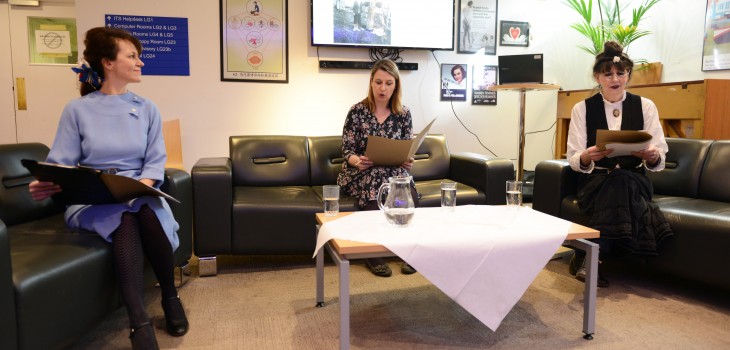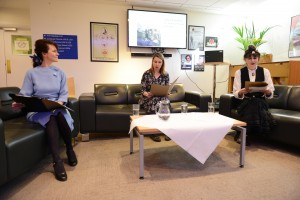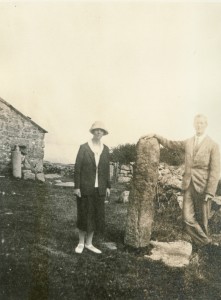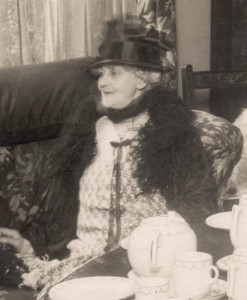One of the many things that I love about my job as an Archivist is the unexpected activities that you become involved in. Working with two actors, Rebecca Tremain and Penny Dimond, has been a great pleasure and a very interesting experience in bringing our archive collections to life.
The idea for Archives Alive developed through the process of assisting with the design of the Women in Science exhibition which is currently on display in the foyer at LSHTM. Early on in the research process, it became clear that although there were not that many prominent women scientists featured in the early days of the School’s history, there were plenty of women who made contributions through their association with male scientists, often their husbands, and therefore contributed to the advance of global public health.
The Archives team knew about some of these women through their knowledge of the collections so when Rebecca and Penny came to do research, they were pointed in the direction of these women. Three stories were chosen and a script was written by Rebecca and Penny which included extracts from diaries, letters and books. The script was read by Rebecca and Penny, with them taking on the characters of the featured women, and I was the narrator giving the story context.
The three women featured were: Amy Carpenter, wife of Geoffrey Carpenter, an entomologist who researched sleeping sickness in Uganda in the 1920s. They wrote a joint diary which details their life in Africa and the scientific work that they both did: “G had 3 dreadful days trying to get all the Sleeping Sickness returns done and he succeeded. This finished a very strenuous 3 months for both of us, we treated 1859 new cases, 2323 re-attendances and 2512 injections were given”.
There is also a lot of information on the social aspects of living overseas, with details of amateur dramatics, cricket matches, dinners and visitors including HRH The Prince of Wales who visited Kampala in October 1928, one of the diary entries is as follows: The Prince did not create a good impression on landing as his clothes looked awful! The natives were disappointed in him: they had turned out in numbers. At the garden party the Prince shook hands with all, including Indians, and conversed with many.
The event was called Archives Alive…Peter Mine, as Peter was Amy’s maiden name and her husband often refers to her as Peter or P.
The second woman featured was Lady Mary Simpson, wife of Sir William Simpson, lecturer at the London School and co-founder of the Ross Institute. In 1917 she invented an anti-mosquito helmet, which she tried to convince Sir Ronald Ross, the discoverer of the mosquito transmission of malaria and who was working at the War Office at the time, to promote on her behalf. The archives contain a series of letters between Lady Simpson and Ross which Penny and Rebecca brought to life, by reading these you could hear the dynamic between these two forthright characters.
Finally the script focused on Mary Kingsley, a pioneering anthropologist and explorer who greatly influenced European ideas about Africa and its people and became an outspoken critic of European colonialism. She wrote a book called ‘Travels in West Africa’ in 1897, which we have a copy of in the rare books collection and she also corresponded with Sir Ronald Ross.
The event took place on 17th February, with over 25 people attending and enjoying the delicious cake provided by our catering team. The audience included staff and students, and external visitors including archivists from other institutions who were interested in the idea of creating a performance from archive material. There are plans to run this event again in the next few months and also to develop the idea of Archives Alive to cover other subjects, especially those features in the forthcoming exhibitions which include vaccination and eye health.
A podcast including some of the performance and an interview with the participants is available at: https://soundcloud.com/lshtm/archive-alive-the-forgotten-women-of-science and an audio slideshow is available here: https://www.youtube.com/watch?v=aDz-DzPDeR4&feature=youtu.be
With great thanks to Rebecca Tremain, Penny Dimond, The Mustard Club and colleagues in External Relations.










![kingsley1e[1]](https://blogs.lshtm.ac.uk/library/files/2015/02/kingsley1e1-248x300.jpg)
